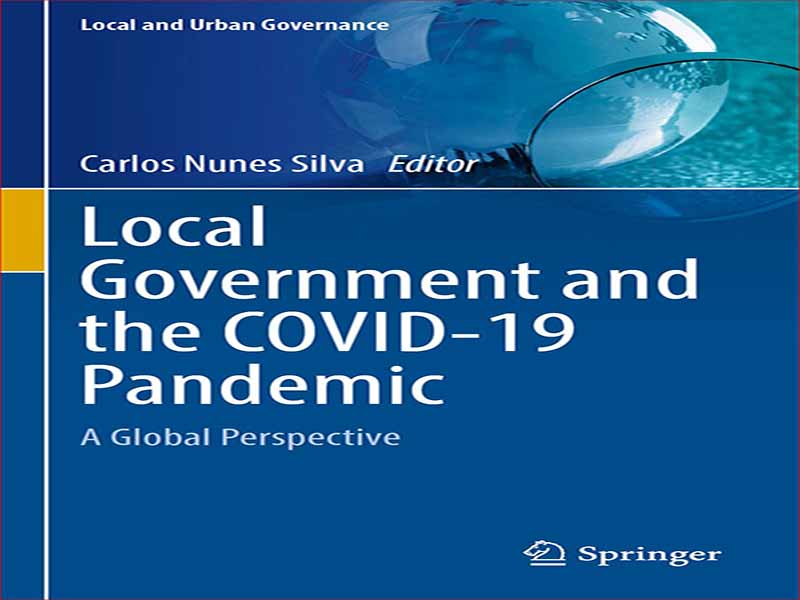- عنوان کتاب: Local Government and the COVID-19 Pandemic
- نویسنده: Carlos Nunes Silva
- حوزه: کرونا
- سال انتشار: 2022
- تعداد صفحه: 799
- زبان اصلی: انگلیسی
- نوع فایل: pdf
- حجم فایل: 14.1 مگابایت
هدف این فصل مقدماتی تشریح برخی از ویژگیهای کلیدی واکنش دولت محلی به چالشهای بهداشتی، اجتماعی و اقتصادی ناشی از همهگیری کووید-۱۹، و همچنین پیامدهای آن بر روابط بیندولتی و حکمرانی چند سطحی است. این بر اساس بررسی ادبیات و یافتههای تحقیق و گزارشهای سیاستی است و به عنوان پیشزمینهای برای آنچه در فصلهای دیگر کتاب میآید، عمل میکند. با طرح کلی کتاب به پایان می رسد. شیوع کروناویروس سندرم حاد تنفسی (SARS-CoV-2) که باعث بیماری کروناویروس 19 (COVID-19) می شود، یک بیماری بسیار مسری و تا کنون، مخل ترین شیوع عفونت قرن بیست و یکم، انگیزه پاسخ فوق العاده ای از سوی تمام سطوح دولتی، از جمله دولت محلی. بر خلاف اپیدمی های قبلی در این قرن، که بیشتر در کشورهای کمتر توسعه یافته تاثیر گذاشت، همه گیری کووید-19 همه انواع کشورها را تحت تاثیر قرار داد. ویروس SARS-CoV-2 برای اولین بار در دسامبر 2019 در ووهان چین گزارش شد و به مناطق مختلف چین و به تدریج به سایر کشورها نیز سرایت کرد. به زودی مناطق اصلی آسیب دیده از آسیا به اروپا و آمریکای شمالی و جنوبی منتقل شدند. در واقع، کل جهان در سه ماهه اول سال 2020 با چالش های بی سابقه بهداشتی، اجتماعی و اقتصادی مواجه شد. برای اولین بار در این عصر جهانی، یک مسئله بهداشت عمومی جهان را در وضعیت نامعلومی به راه انداخت، مفروضات دیرینه را زیر سوال برد و مجموعه ای از نابرابری ها را در شهرها، در سایر سکونتگاه های انسانی و در ظرفیت ها بیشتر نمایان کرد. ایالت ها و لایه های دولتی زیرملی برای پاسخ به یک وضعیت اضطراری ملی و یک رویداد شدید جهانی. پاسخ خط مشی به این بحران چند لایه بود و نهادهایی از سطوح محلی تا جهانی را درگیر کرد. هدف این کتاب پر کردن برخی از شکافهای موجود در دانش درباره واکنش دولت محلی به این بحران بهداشتی است. بنابراین اساساً بر پاسخها در سطح محلی متمرکز است. و همانطور که در فصول بعدی مشاهده خواهد شد، فرهنگ سیاسی ملی حاکم هر چه باشد، دولت محلی بار دیگر در سال اول همهگیری کووید-19، ارزش اقدام عمومی محلی را بر اساس نزدیکی به شهروندان و چگونگی نشان داد. مهم این است که به طور موثر و کارآمد به اثرات اجتماعی و اقتصادی این بحران بهداشتی جهانی رسیدگی شود. به نظر می رسد تأثیر همه گیری کووید-19 بر دولت محلی، تغییراتی که در سازمان و عملکرد دولت محلی، تقریباً در همه جا، و در رابطه آن با دولت مرکزی و سازمان های اجتماعی ایجاد کرد، یک سال پس از OMS باشد. در 11 مارس 2020، کووید-19 را یک بیماری همه گیر اعلام کرد، یک روند بزرگ جهانی دیگر که بر دولت محلی تأثیر می گذارد، علاوه بر جهانی شدن اقتصادی، دموکراتیزه شدن، تمرکززدایی، دیجیتالی شدن، تغییرات آب و هوایی، و انتقال زیست محیطی، به ذکر چند مورد از دیگر روندهای بزرگ جهانی. که در دهه های اخیر بر توسعه دولت محلی در سراسر جهان تأثیر گذاشته و همچنان بر آن تأثیر می گذارد. همانطور که در سیلوا (2020) نشان داده شده است، دولت محلی به طور نابرابر در مناطق مختلف جهان توسعه یافته است، که در سطح نسبتاً نابرابر خودمختاری و ظرفیت مداخله آن منعکس شده است. این تا حدی ناشی از سطح عدم تمرکز اداری حاکم در هر کشور و درجات متفاوت استقلال مالی است که به دلیل فرآیندهای تاریخی خاص متفاوت است. این تفاوتهای ساختاری در واکنش دولت محلی نسبت به تأثیرات همهگیری کووید-19 منعکس میشود که به طور مثبت با جغرافیای خودمختاری دولت محلی و ظرفیت مالی همبستگی دارد. و دیدگاه مشابهی از تجزیه و تحلیل پاسخ احتمالی به اثرات اجتماعی و اقتصادی در روند بهبود پس از همهگیری پدیدار میشود که تا حدودی منعکس کننده جغرافیای موجود دولت محلی است.
This introductory chapter aims to outline some of the key features of the local government response to the sanitary, social, and economic challenges raised by the Covid-19 pandemic, as well as its implications on intergovernmental relations and on multilevel governance. It is based on a review of the literature and on findings from research and policy reports and serves as a background for what follows in the other chapters of the book. It ends with an outline of the book. The outbreak of the Severe Acute Respiratory Syndrome Coronavirus (SARS-CoV- 2), that causes the Coronavirus Disease 19 (COVID-19), a highly contagious disease and, so far, the most disruptive infection outbreak of the twenty first century, motivated an extraordinary response by all tiers of government, including local government. Contrary to previous epidemics in this century, which impacted mostly in less-developed countries, the Covid-19 pandemic affected all sorts of countries. The SARS-CoV-2 first reported in Wuhan, China, in December 2019, spread to different parts of China, and gradually also to other countries. Soon the main areas affected shifted from Asia to Europe, and to North and South America. In fact, the entire world was confronted in the first quarter of 2020 with unprecedented sanitary, social, and economic challenges. For the first time in this global age, a public health issue launched the world in a state of uncertainty, questioned long-held assumptions, and made more visible a whole series of inequalities in cities, in other human settlements, and in the capacity of the State and subnational tiers of government to respond to a national emergency and to a global extreme event. The policy response to this crisis was multilayer and involved institutions from local to global levels.2 The book aims to fill some of the gaps still existent in the knowledge about the response of local government to this health crisis. It is therefore focused primarily on the responses at the local level. And as will be seen in the following chapters, whatever the prevailing national political culture, local government showed once again, in the first year of the Covid-19 pandemic, the value of the local public action, based on proximity to citizens, and how important this has been to address effectively and efficiently the social and economic impacts of this global sanitary crisis. The impact of the Covid-19 pandemic on local government, the changes it forced in the organization and functioning of local government, almost everywhere, and in its relation with central government, and with community organizations, seems to be, 1 year after the OMS declared the Covid-19 a pandemic, on 11 March 2020, another mega global trend affecting local government, in addition to economic globalization, democratization, decentralization, digitalization, climate change, and ecological transition, to mention just few of the other global mega trends that have impacted in recent decades and continue to affect the development of local government around the world. Local government is unequally developed in the different regions of the world, as shown in Silva (2020), which is reflected in its rather uneven level of autonomy and capacity to intervene. This in part results from the level of administrative decentralization prevailing in each country and from the disparate degrees of financial autonomy, which vary because of specific historical processes. These structural differences are reflected in the response of local government toward the impacts of the Covid-19 pandemic, which correlates positively with the geography of local government autonomy and financial capacity. And a similar perspective emerges from the analysis of the possible response to the social and economic impacts in the postpandemic recovery process, reflecting to some extent the existent Geography of local government.
این کتاب را میتوانید بصورت رایگان از لینک زیر دانلود نمایید.




































نظرات کاربران